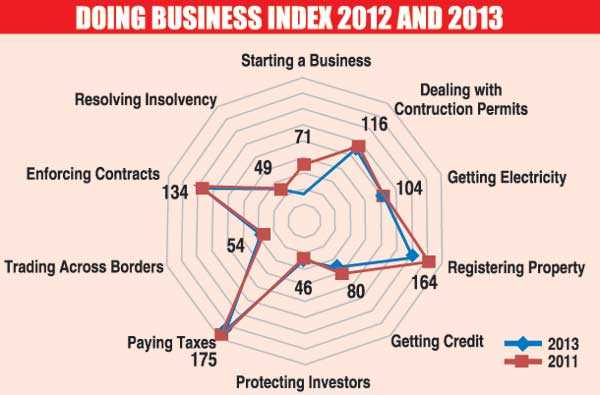Reply To:
Name - Reply Comment
Last Updated : 2024-04-24 11:32:00
.jpg) Sri Lanka’s rank on the World Bank’s well respected Ease of Doing Business Index (covering 185 economies) improved considerably over the last year. Vaulting from 96th in the world to 81st, an improvement of 15 places, is no mean feat. A back of the envelope calculation based on the World Bank’s ‘Does doing business matter for foreign direct investment?’ report indicates that these reforms should have led to an approximately US $ 1 billion increase in foreign direct investment (FDI). Sri Lanka’s FDI never reached US $ 1.8 billion -it fell over the two-year period from US $ 896 to US $ 813 million. One doesn’t require an economist to tell you this is odd and needs explanation.
Sri Lanka’s rank on the World Bank’s well respected Ease of Doing Business Index (covering 185 economies) improved considerably over the last year. Vaulting from 96th in the world to 81st, an improvement of 15 places, is no mean feat. A back of the envelope calculation based on the World Bank’s ‘Does doing business matter for foreign direct investment?’ report indicates that these reforms should have led to an approximately US $ 1 billion increase in foreign direct investment (FDI). Sri Lanka’s FDI never reached US $ 1.8 billion -it fell over the two-year period from US $ 896 to US $ 813 million. One doesn’t require an economist to tell you this is odd and needs explanation.

Add comment
Comments will be edited (grammar, spelling and slang) and authorized at the discretion of Daily Mirror online. The website also has the right not to publish selected comments.
Reply To:
Name - Reply Comment
US authorities are currently reviewing the manifest of every cargo aboard MV
On March 26, a couple arriving from Thailand was arrested with 88 live animal
According to villagers from Naula-Moragolla out of 105 families 80 can afford
Is the situation in Sri Lanka so grim that locals harbour hope that they coul